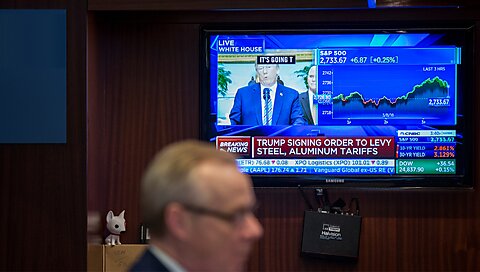If you expected a second Trump term to usher in some sort of new era of free speech, you might by now be feeling some rueful secondthoughts. In the latest development, Trump’s pick for federal prosecutor in Washington, DC, Edward R. Martin Jr., has sent a threat/investigation letter to Rep. Robert Garcia (D‑CA) over comments that Garcia made during a live CNN interview on Feb. 12. Asked about Democrats’ response to Elon Musk, Garcia evoked a hackneyed trope about political hardball: “What the American public wants is for us to bring actual weapons to this bar fight. This is an actual fight for democracy.” Martin sees fit to pretend that these remarks somehow constitute an actual physical threat to Musk.
Martin sent a similar letter to Sen. Chuck Schumer (D‑NY) over his intemperate “released the whirlwind” speech at the Supreme Court four years ago, on the premise that it too might have posed an unlawful threat to public officials. I wrote a piece at the time deploring those remarks of Schumer’s as reprehensible and out of line. But I never imagined for a moment that they amounted to some sort of legally cognizable threat to the Justices’ personal security. (Schumer says that by “whirlwind” he had in mind political and public-image consequences for the court.)
Under longstanding Supreme Court doctrine, antagonistic speech, very much including speech antagonistic toward a public official, is ordinarily constitutionally protected by the First Amendment unless it falls into one of several narrow exceptions. Most relevant here is whether it is a “true threat,” which the Court said in the 2003 case of Virginia v. Black must involve “a serious expression of an intent to commit an act of unlawful violence to a particular individual or group of individuals.” Nothing of the sort is present in either case here.
In the earlier case of Watts v. United States (1969), the court made clear that courts must distinguish true threats from the sort of “political hyperbole” that is commonly heard if often intemperate and alarming. The Watts case arose from a 1966 incident in which the defendant, attending an anti-war rally at the Washington Monument, allegedly said, “If they ever make me carry a rifle, the first man I want to get in my sights is L.B.J.” Protected speech, the court said, and that holding stands today.
Nor would Martin get anywhere in court if he tried to invoke the First Amendment exception for “incitement.” That exception applies to speech that is both “directed to inciting or producing imminent lawless action” and “likely to incite or produce such action”—zero for two in both cases.
The Hill reports yet another problem for the letters: “Any advancement of Martin’s probe would stretch the bounds of speech and debate clause protections, which bars prosecution of lawmakers on matters directly tied to their jobs.”
Ironically, Martin made his name in public life over the past four years as a leading advocate for January 6 rioters, arguing that those rioters had been punished excessively for their actions, which in many cases included not just threatening public officials in extravagant terms (“Hang Mike Pence!”) but besieging them in their chambers, rampaging through their offices, and beating up the police who sought to defend them. The very high threshold needed to prove true threat or incitement, and thereby to punish speech when unaccompanied by violent action, no doubt worked to the benefit of his clients in many cases. It’s hard to believe that he did not develop a familiarity with both bodies of doctrine.
Perhaps Martin has changed his views on what constitutes threatening a public official. Or perhaps having helped set free his often-violent allies, he is now bent on prosecuting even his nonviolent political opponents.


























